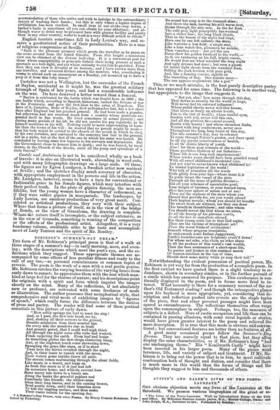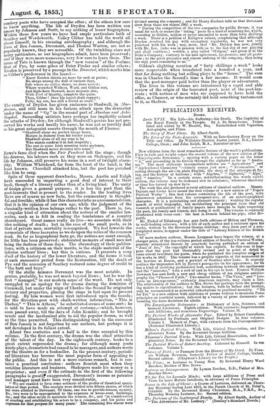• The Lives of the Poets-Laureate. 'With an Introductory Essay
on the Title and Office. By Wiltshire Stanton Austin junior, B.A., Exeter College, Oxon; and John Ralph, Id.A., Barrister-at-law. Published by Bentley.
oondary poets who have accepted the office ; of the others few care to know anything. The life of Dryden has been written con amore by Johnson and Scott, to say nothing of lesser biographers. Within these few years we have had ample particulars both of Southey and Wordsworth. Colley Cibber has told the world all about himself, in his amusing autobiography ; and although the lives of Ben Jonson, Davenant, and Thomas Warton, are not so popularly known, they are accessible. Of the twinkling stars not many particulars, as our biographers admit, have been preserved ; and if they were more numerous, very few care to learn them. The name of Tate is known through the " new version " of the Psalms; that of Pye, by some gibes of Peter Pindar and similar others ; Eusden is preserved by a passage in the Dunciad, which marks him as Cibber's predecessor in the laurel- " Know Eusden thirsts no more for sack or praise ;
He sleeps among the dull of ancient days, Safe where no critics damn, no duns molest; Where wretched Withers, Ward, and Gildon rest, And high-born Howard, more majestic sire, With Fool of Quality, complete the quire. Thou, Cibber ! thou his laurel shalt support; Folly, my son, has still a friend at court."
The enmity of Dryden has given eminence to Shadwell, in Mae- fecnoe, and still more in his furious attack upon the dramatist under the name of " Og " in the second part of Absolotn and Achi- thophel. Succeeding satirists have perhaps too implicitly echoed the attacks of Dryden' for although Shadwell's genius has not pre- served his works and hardly his name, he was not so terribly dull as his great antagonist asserts through the mouth of Flecnoe.
"Shadwell alone my perfect image bears, Mature in dulness from his tender years ; Shadwell alone of all my sons is he Who stands canfirm'd in full stupidity ; The rest to some faint meaning make pretence, But Shadwell never deviates into sense."
Rowe's fame died when the Fair Penitent left the stage ; though his dramas, his labours such as they were on Shakspere, and his life by Johnson, still preserve his name in a sort of twilight obscu- rity. William Whitehead, far from the least of the band, is the least known. Churchill attacked him, but the poet has perished like him he sang. Spite of these apparent drawbacks, Messrs. Austin and Ralph have succeeded in imparting a good deal of interest to their book, though of a literary rather than of a living kind. The unity of design gives a general purpose; it is less the poet than the poet-laureate that is present to the reader. In the leading lives there are of course no new facts, but the commentary is thought- ful and forcible; while it has this characteristic as arecommendation, that it is the opinion of our own age, while the judgment of the classically-written lives belongs rather to the past. There is, too, a singular kind of attraction about the notices of the smaller lau- reates, such as is felt in reading the tombstones of a country churchyard. Great names really do live—we associate with their idea nothing of death ; but in the case of the small poets, as in that of private men, mortality is recognized. We feel towards the memorials of these laureates as we do upon the relics of the common dead. So far as biographical facts go, the notices are scant enough, for little has been preserved ; elaborated memoirs of small men not being the-fashion of those days. The chronology of their publica- tions, with a criticism on their merits, is the staple material of the inferior authors' lives ; but this is curious. It presents a coup d'ceil of the history of the lower literature, and the forms it took at each successive period from the Restoration, till the death- f Pye and the accession of Southey restored some degree of credit to " the butt and bays."
Of the dente minores Davenant was the most notable. In genius, probably, he was not much beyond Rowe ; but he was the first " manager, in our modern sense of the word. He not only smuggled in an apology for the drama during the dominion of Cromwell, but under the reign of Charles the Secondle originated scenery and properties, placing the stage in fact upon its present footing. By him women were first introduced upon the boards ; for the direction-post with chalk-written information, " This is Thebes," " This is Athens," he substituted scenes of some sort ; he is said to have made an attempt at costume,—which, however, soon passed away, till the days of John Kemble • and he brought music and the mechanical arts to aid the popular drama, as well as the time permitted. This distinguishing trait in the successor of Ben Jenson is not forgotten by our authors, but perhaps it is not developed in its fullest extent. About two centuries and a half is the time occupied by this yelrime. In the first century, the drama was the chief attraction of the .talent of the day. In the eighteenth century, books to a great extent superseded the drama ; for although many poets wrote plays, dramatists had ceased to be managers, and authors wrote for the theatre as for a bookseller. In the present century, periodi- cal literature has become the most popular form of appealing to the public. And this is not a mere curious remark, but it con- tains a practical conclusion : authors flourish most when they combine literature and business. Shakspere made his money as a proprietor; and even if the estimate in the first of the following paragraphs is greatlf exaggerated, Davenant's income as patentee and manager must have been very considerable.
" We are enabled to form some estimate of the profits of theatrical specu- lation of that period. The receipts were divided into fifteen shares, of which ten were allotted to Davenant. Of these, one was to provide dresses, scenery, &e., two were to be appropriated to the expenses of house-rent, buildings, &c., and the other seven to maintain the women, &c., and 'in consideration of erecting and establishing his actors to be a company, and his pains and expenses for that purpose for many years.' The remaining five shares were
divided among the company ; and Sir Henry Herbert tells us that Davenant drew from these ten shares 2001. a week.
" During the competition of the two companies for public favour, it was usual for each to secure the taking ' poets by a kind of retaining fee, which, according to Gildon, seldom or never amounted to more than forty shillings a week. There is a petition of Killigrew extant, complaining that although Dryden received his pay with exemplary regularity, he was not very punctual with his work ; nay, more, that ' Mr. Dryden has now, jointly with Mr. Lee, (who was in pension with us to the last day of our playing and shall continue,) written a play called '1Edipus,' and given it to the Duke's Company, contrary to his said agreement, his promise, and all grati- tude ; to the great prejudice and almost undoing of the company, they being the only poets remaining to us.'"
Gildon's slighting mention of " forty shillings a week" looks more respectable when translated into a hundred a year, and
that for doing nothing but selling plays to the " house." The sum was in Charles the Second's time a fair income. It would seem that the poet-manager paid better than the player or adventurer.
The lives in this volume are introduced by a rapid and able review of the origin of the laureated poet, next of the poet-lan- reate ; with notices of men who are supposed to have held the office, as Chaucer, or who certainly did hold something tantamount to it, as Skelton.



























 Previous page
Previous page